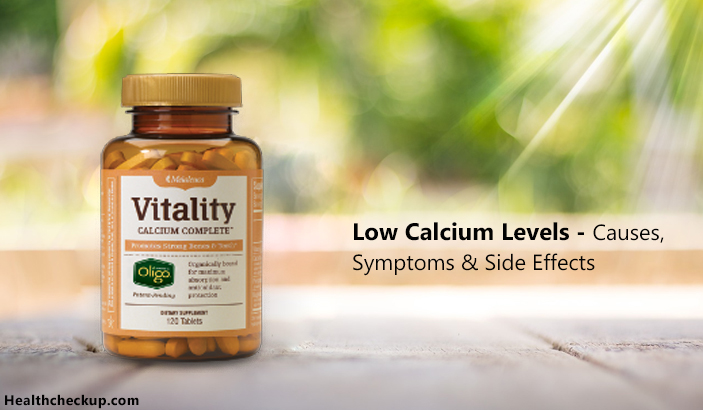Calcium is a vital element in the body. It is the most crucial and abundant mineral in the human body. It is responsible for strong bones, teeth, and proper brain functions. Since it is an element, the body cannot generate it naturally. Hence, you need to get it from vital foods and Vitamin D. Today, we are looking at how dangerously low calcium levels affect the body.
What Happens When The Blood Calcium Level Is Dangerously Low?
Having dangerously low calcium levels is known as Hypocalcemia. This severe calcium deficiency disease has adverse long term effects. If the building material is absent, they become weak. Dangerously low calcium levels cause osteoporosis. Bones require calcium for their formation. Ultimately, the bones become brittle due to the thinning of the bone matter.
The dental matter erodes due to the low calcium levels. Due to the deficiency of calcium, the teeth weaken in the mouth. This may lead to your teeth decaying. In some instances, they may fall off. Cataracts form in your eyes when you have dangerously low calcium levels.
[Also Read: Calcium deficiency test]
Low calcium levels in the blood make the brain to malfunction. Since the brain coordinates the senses and muscle coordination, you will suffer lapses in your synchronization. If you do not seek medical attention on time, these conditions can be fatal.
What Causes Dangerously Low Calcium Levels?
The causes of Hypocalcemia are generally in two categories. There are genetic and external factors. Genetic or hereditary factors are hard to treat. For some reason, the body cells do not generate calcium from the food source. This calls for medication. As for the external factors, the remedy is slightly easier.
In essence, the external factors are;
Poor or Low Intake Of Calcium
This can happen during pregnancy and childhood. Pregnant mood swings and intolerance can make the baby have a calcium deficiency. Again, children are poor eaters. Thus a little supervision needs to follow them.
Malnutrition
Malnutrition also causes dangerously low calcium levels in the body.
Medications
Certain medications may hinder the body from absorbing the optimum amount of calcium.
Allergic Reactions To High Calcium Foods
Allergic reactions to food that contain a higher content of calcium. Some people are highly intolerant to some foods that are rich in calcium.
Physiological Hormonal Changes In Women
Unlike men, women undergo severe swings in the hormonal imbalances. This can cause dangerously low calcium levels.
Some medical conditions or body organs malfunctioning can hinder the absorption of calcium.
Alcohol and Tobacco Consumption
Lifestyle tendencies like alcohol and tobacco consumption also may lead to Hypocalcemia.
What Are The Symptoms Of Low Calcium Levels?
The symptoms of low calcium levels are diverse. During the early stages, it is not easy to identify them. But they manifest as the deficiency levels advance in stages. In infants, the symptoms may vary.
Symptoms In Infants
- Poor feeding and lactating patterns
- Body seizures
- Slowness in breathing
- A hyper heartbeat
Symptoms In Adults
- Neurological manifestations like memory loss and confusion
- Hallucinations
- The feeling of numbness especially in the arms, legs, and the face
- Seizures
- Muscle cramps
- Brittle nails, hair, and fragile skin
- Easy fracturing of bones
- Abnormal fatigue
As you may note, calcium is a vital element in the body. These are some of the clinical manifestations. To be certain, it is better to seek medical advice before conclusions. Besides, by the time these symptoms appear, the body already has dangerously low calcium levels.
Side Effects Of Low Calcium Levels
The general side effects of dangerously low calcium levels include but are not limited to;
- Poor vision and eye damage
- Dental problems
- Irritating skin disorders
- Difficulty in breathing
- Poor mobility from chronic muscle and joint pain
- Brittle bones and fractures
- Total disability
- Depression
What Is The Treatment For Low Calcium Levels?
The best way to approach the treatment is through dietary enrichment. When you have a proper diagnosis, the doctor may prescribe some calcium-enriched medication for you. In the long-term, you need to improve your dietary calcium intake.
Some of the foods that are rich in calcium are;
- Dairy products like yogurt, butter, cheese, and milk
- Leafy green vegetables like broccoli, amaranth, and spinach
- Certain cereals like beans and soya
- Nuts like almonds and the sesame seeds family
- Dried figs
Conclusion
It is good to have calcium supplements if you have dangerously low calcium levels. But for a long-lasting solution, you have to start eating a balanced diet rich in calcium. Ultimately, that will boost your overall immunity to many other diseases.
Doctor, author and fitness enthusiast, Ahmed Zayed, MD, is a surgery resident with a passion for helping people live a happy healthy life. He is the author of numerous health-related books and contributor to several medicine, health and wellbeing websites.








